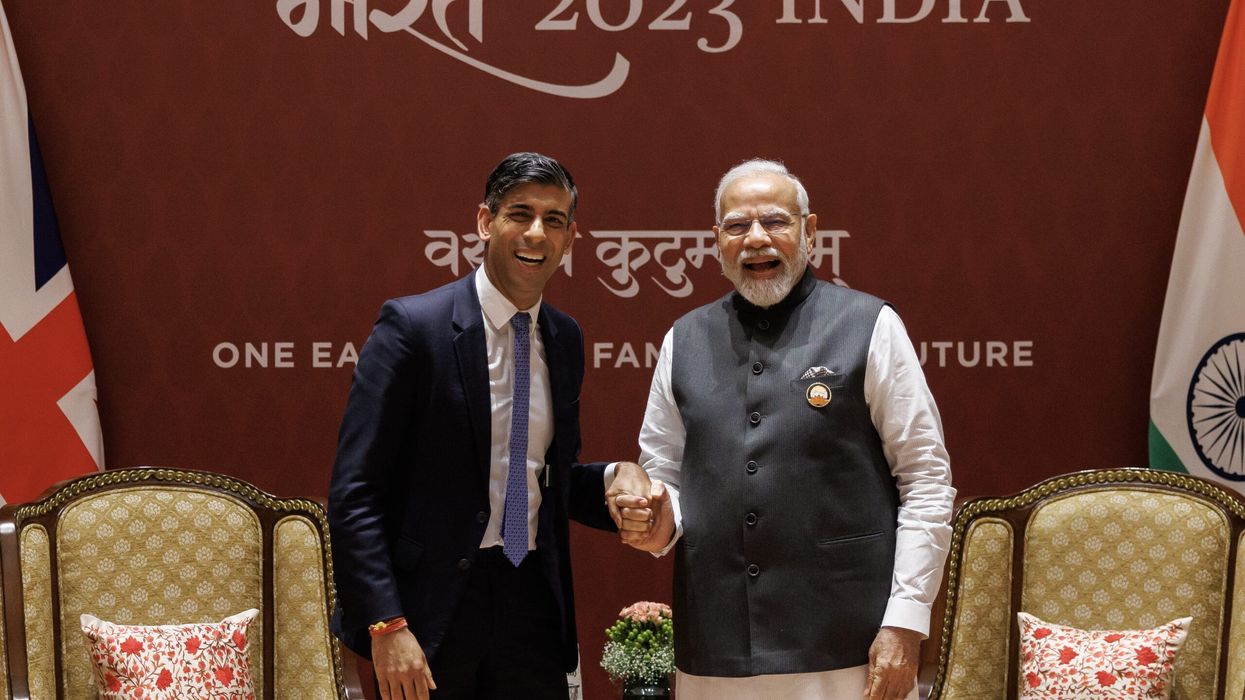ONE of Britain’s leading foreign policy experts said he would urge the Indian prime minister Narendra Modi to show “magnanimity” in the light of the results of the general election, in which the ruling Bharatiya Janata Party (BJP) has not done as well as it had expected.
Lord Simon McDonald, who was going to be the British high commissioner in India but was instead promoted to the top job in the Foreign and Commonwealth Office (FCO) in London, said in an exclusive interview with Eastern Eye.
A veteran diplomat who is now Master of Christ’s College, Cambridge, McDonald sits in the Lords as a cross-bench peer. From 2015-2020, he was permanent under-secretary at the then FCO, making him the most senior civil servant in charge of the department. He was previously British ambassador in Israel and Germany, and had served in Jeddah, Riyadh, Bonn and Washington. He read history at Pembroke College, Cambridge, where one of his chosen papers was on the Partition of India.
His wife, Olivia, is the daughter of Patrick Wright, who was also permanent undersecretary at the Foreign Office.
On several official trips to India, McDonald has met Manmohan Singh, when he was prime minister; S Jaishankar, India’s external affairs minister; and MK Narayanan, the country’s former national security adviser.
On Wednesday (5), he was due to speak at the Khushwant Singh Literary Festival at Christ’s about foreign policy, UK-India relations, and his two books, Leadership: Lessons from a Life in Diplomacy and Beyond Britannia: Reshaping UK Foreign Policy.
McDonald spoke to Eastern Eye as results on Tuesday (4) from India as the newspaper went to press indicated that in the 543-seat Lok Sabha (lower house of parliament), the BJP and its allies would get 289 – far short of the 350-400 exit polls had predicted – while the INDIA block, including Congress, would reach 236. Other parties would get 18.
“There’s always interest in surprises that the BJP and Modi personally had high expectations of a landslide victory, which would affirm all their policies – and it appears this has not happened,” began McDonald.
“So, the first question is what impact this has on the government of India. BJP and Modi are still in charge. But they don’t have quite the backing they had hoped for maybe for their most ‘adventurous’ agenda. So, in what way will they throttle back?
“Might this affect Modi’s enthusiasm personally to remain in charge?” he wondered, referring to India’s 74-yearold prime minister.
“I mean, he’s getting on,” continued McDonald. “The succession must be increasingly discussed within his party. Might it now be possible that he will not serve the full five years of this mandate? So I think there’s a lot of work that people will do about the meaning (of the result) for India.”
He turned to the possible reaction of the Foreign Office.
“For us, I think as an outside commentator, you can be a little bit more forward than a BBC journalist. What does it mean for a Labour government? The Labour party traditionally has had a difficult relationship with India. This goes all the way back to the 1940s, the Attlee government being in charge when India became independent.

“And the party is very conscious of this. I think they’re very careful about this. And they want a good relationship. They want a better relationship than previous Labour governments have had. And I think because it’s such a long time since they were in power, any of the personalities that might have been associated with that more difficult era has moved on. It feels to me there is a more realistic prospect for a Labour government to have a good, positive reset with Indo-British relations.”
He added: “I don’t think there’ll be a rethink about the (UK-India) relationship. (But) I think there will be a rethink about the possibilities that the Modi government can aspire to with a smaller majority. He’s more constrained.”
McDonald’s experience as an old foreign policy hand told him that “expectations are crucial in politics. And when someone has fallen short against expectations, that impacts them, even though absolutely, he (Modi) still is leading a majority government. Absolutely he is in charge. But psychologically, he is not doing as well as he had hoped. And that will have an impact.”
There have been suggestions that western governments, including the UK, tempered their criticism of Modi for business reasons.
McDonald countered: “I mean, further back the British government had no relationship with Modi. We disapproved of various things he did in Gujarat. And so we had to build a relationship with him when he took over. It’s not that we haven’t criticised – we’ve absolutely did criticise. But when a man is in charge of the world’s biggest democracy, there is a certain recalibration. Maybe it is a perfectly fair observation that perhaps in making up for lost ground, the British bent over backwards to have as positive a relationship as possible.”
What would be his advice to Modi as someone who had written and lectured extensively on leadership? “(Show) magnanimity,” he summed up.
What he would say to Modi would be: “I mean, you’re still in charge, sir. We say you’ve achieved something that hasn’t been achieved since the early days of the (Indian) republic – to have a third consecutive mandate. This is historic. But, we have to be honest. This (result) is not what you were expecting. So, this should impact the scope of your ambition.”
He believed that “some of his most controversial policies, I suspect, are one reason why he has not achieved the thumping mandate he had hoped for. Some of the identity issues, some of the divisive issues in India, some of the divisive policies. Maybe this is a time to throttle back.
“India, in the end, is more than a Hindu nation. I think in your final administration, sir, you should do more to embrace that.”
McDonald did not quite agree with the British statesman and prime minister, Lord Palmerston, who had told the Commons in 1848: “We have no eternal allies, and we have no perpetual enemies. Our interests are eternal and perpetual, and those interests it is our duty to follow.”
He laughed: “I’m not sure that Palmerston was right. I know it is everywhere quoted. Indeed, in my book, I don’t quote that with entire approval.”
He said: “The United Kingdom is a medium-sized power that wants to have a voice in the wider world. In that situation, it needs constructive relations with all the bigger powers. India, as we look into the second half of the 20th century, is a bigger power, that will be a bigger power than the United Kingdom. So it feels to me logical that we would be trying to have as positive a relationship as possible. History is a complication. But we need to come to be honest about the sort of history to incorporate into our relationship.”
He doubted whether a UK-India Free Trade Agreement was imminent “because of Indian reasons. In the Indian system, there are many interests that have to be balanced. And from the British point of view, the generosity of the visa regime is going to be a complication in the end game. The issue can be left for the longest time, but it can’t be left forever.
“I don’t know if you were listening to the radio this morning. But immigration is one of the top issues in the election campaign.
“And nobody is talking about being more generous to any other country in allowing their citizens to visit and work in the UK.”




